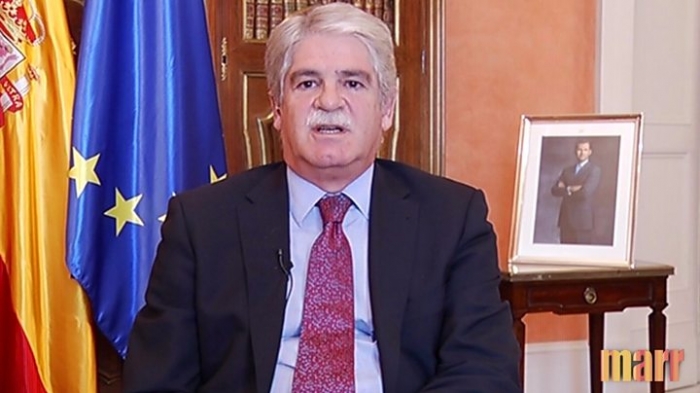"If anyone has attempted a coup, it is the Catalan regional government, Mr Dastis told the BBC.
Madrid acted after regional leaders refused to halt an independence drive.
The Catalan government, led by President Carles Puigdemont, points to the majority "Yes" vote in a referendum on independence it held on 1 October in the teeth of a Spanish court ban.
Of the 43% of Catalans said to have taken part, 90% voted in favour of independence, it said.
Unionist parties who won about 40% of the vote at the 2015 Catalan elections boycotted the ballot and many anti-independence supporters stayed away, arguing it was not valid.
What is the Spanish government's position?
On Saturday, Prime Minister Mariano Rajoy announced plans to sack Catalonia's regional government and curtail some of the freedoms of its parliament.
Reports suggest the central authorities will also seek to take control of Catalonia's local police force and its public broadcaster, TV3.
"If there is a coup d'état, this is one followed by Mr Puigdemont and his government," Mr Dastis told The Andrew Marr Show.
"What we are doing is following strictly the provision of our constitution," he said, describing it as a "carbon copy of the German constitution".
"If you look at the rest of democracies and certainly partners in the European Union, they wouldn't accept a decision as such to be taken by a part of the country."
He also argued that "many" images of police violence against protesters on referendum day were fake.
The government itself apologised to injured demonstrators days after the vote, as a result of which 1,066 people required medical attention, according to the Catalan health department.
The ferocity of the police response was reported at the time by the BBC's Tom Burridge.
What exactly is a 'coup d'état'?
The French term literally means a "blow against the state" and refers to the sudden, usually violent, overthrow of a country's government.
Catalan nationalists regard their region as a nation and state in its own right, a definition Spain does not accept.
Spain last saw a coup attempt on 23 February 1981 when soldiers and police stormed parliament, firing guns and shouting orders.
The rebellion was suppressed but came as a startling reminder of the country's recent military dictatorship (1939-75) under Gen Francisco Franco.
President Puigdemont has described the move to impose direct rule as the worst attack on Catalonia's institutions since Franco, when the region lost its autonomy.
What do the Spanish media say?
"Return to the past" is how Catalonia's Catalan-language, pro-independence El Punt Avui sums up Saturday's developments on its front page. In an opinion piece, Xevi Xirgo argues that Madrid is mounting a "coup d'état" to submit Catalonia to central rule in a way not seen since the 18th Century.
In an editorial in El Periódico, Spain's fifth-biggest newspaper which publishes both in Spanish and Catalan, Enric Hernàndez argues that Madrid responded in kind to "the aggression of the independence camp", which ignored Spanish law to hold a "sham referendum".
Hernàndez calls on Mr Puigdemont to agree to Mr Rajoy's call for early regional elections as the best way out of the crisis or else face a "social revolt with unforeseeable consequences".
Meanwhile El País, Spain's biggest paper, a left-of-centre daily, endorses the government in an editorial entitled "The democratic state responds" and declares that Mr Rajoy is acting to "restore constitutional legality in Catalonia". "Democracy not only has the right to defend itself but a duty to do so," it says.
What happens next?
The Spanish Senate is expected to approve the government's measures on Friday along with a proposal for fresh regional elections.
There are reports that the Catalan parliament plans to meet the same day to debate the crackdown.
Mr Puigdemont has said his government will not accept direct rule. On Saturday, an estimated 450,000 people protested in the regional capital Barcelona, chanting "independence" and "freedom".
Appeals by separatists for outside intervention in the crisis have had little effect, with the EU taking the position it is an internal affair for Spain to decide.
More about: #Catalonia
















































